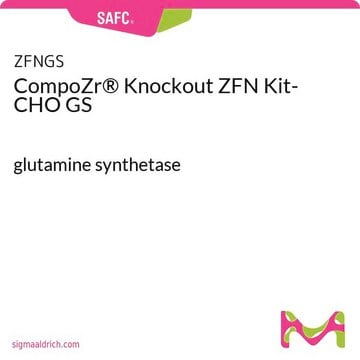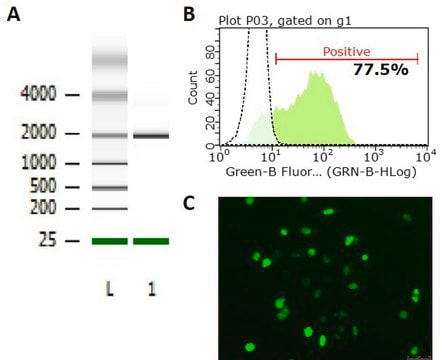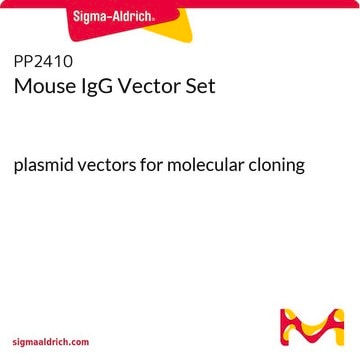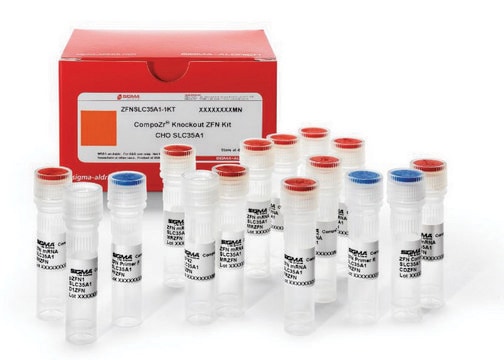CSTZFN
CompoZr® Custom Zinc Finger Nuclease (ZFN)
ZFN plasmid and mRNA
Synonyme(s) :
Zinc Finger Nuclease
Se connecterpour consulter vos tarifs contractuels et ceux de votre entreprise/organisme
About This Item
Code UNSPSC :
12352200
Produits recommandés
Gamme de produits
CompoZr®
Conditions d'expédition
dry ice
Température de stockage
−70°C
Vous recherchez des produits similaires ? Visite Guide de comparaison des produits
Catégories apparentées
Description générale
Zinc Finger Nucleases (ZFNs) are a class of engineered DNA-binding proteins that facilitate targeted editing of the genome by creating double-strand breaks in DNA at user-specified locations. Double-strand breaks are important for site-specific mutagenesis in that they stimulate the cell′s natural DNA-repair processes, namely homologous recombination and Non-Homologous End Joining (NHEJ). By implementing established, field-proven methods, these processes can be harnessed to generate precisely targeted genomic edits, resulting in cell lines with precise and heritable gene deletions, integrations or modifications.
Application
Functional Genomics/Target Validation
- Creation of gene knockouts in multiple cell lines
- Complete knockout of genes not amenable to RNAi
- Creation of knock-in cell lines with promoters, fusion tags or reporters integrated into endogenous genes
- Creation of cell lines that produce higher yields of proteins or antibodies
The CompoZr Custom ZFN service can be used to target genes from a variety of organisms. Validation of the custom ZFNs is completed in a proxy cell line for human, mouse, rat and hamster (CHO) projects. In this assay, the candidate ZFNs are delivered to the proxy cell line and activity is identified and measured. Activity is measured by amplifying over the ZFN target site and then using a nuclease mismatch enzyme to cut DNA strands that have been modified. ZFN efficiency can be measured based on the densitometry results of this assay. CompoZr Custom ZFN Projects for human, mouse, rat, and hamster (CHO) will have a production timeline of 10 weeks after the ZFN design is approved.
Caractéristiques et avantages
- Rapid design, assembly, and validation of a ZFN pair targeting your gene of interest
- Rapid and permanent disruption of, or integration into, any genomic loci
- Mutations made are permanent and heritable
- Works in a variety of mammalian somatic cell types
- Edits induced through a single transfection experiment
- Knockout or knock-in cell lines in as little as two months
- Single or biallelic edits occur in 1-20% of clone population
- No antibiotic selection required for screening
Composants
- Best Performing ZFN Pair
- 10 Aliquots of Ready-to-Deliver ZFN Pair in mRNA form
- ZFN Pair in Plasmid Form
- Forward and Reverse Primers that allow for determination of rate of mutation and for screening of individual clones
- Positive Control DNA
- Used to determine a baseline cutting efficiency
Autres remarques
To have a ZFN made targeting your gene of interest, please inquire about our
Custom ZFN Service offering HERE
Custom ZFN Service offering HERE
Informations légales
All Zinc Finger Nucleases are sold under license from Sangamo Biosciences. For a copy of the Label License provided with purchase of CompoZr ZFNs, please visit the ZFN Label License page.
CompoZr is a registered trademark of Merck KGaA, Darmstadt, Germany
Produit(s) apparenté(s)
Réf. du produit
Description
Tarif
Code de la classe de stockage
10 - Combustible liquids
Point d'éclair (°F)
Not applicable
Point d'éclair (°C)
Not applicable
Certificats d'analyse (COA)
Recherchez un Certificats d'analyse (COA) en saisissant le numéro de lot du produit. Les numéros de lot figurent sur l'étiquette du produit après les mots "Lot" ou "Batch".
Déjà en possession de ce produit ?
Retrouvez la documentation relative aux produits que vous avez récemment achetés dans la Bibliothèque de documents.
Chun Cheng Andy Chen et al.
Physiological genomics, 45(3), 110-118 (2012-12-20)
The present study employed a zinc-finger nuclease strategy to create heterozygous knockout (KO) rats for the transforming growth factor-β1 (Tgfb1) gene on the Dahl SS/Jr genetic background (TGF-β1(+/-) Dahl S). Intercrossing TGF-β1(+/-) rats did not produce any homozygous KO rats
Yoshihiro Inami et al.
The Journal of cell biology, 193(2), 275-284 (2011-04-13)
Suppression of autophagy is always accompanied by marked accumulation of p62, a selective autophagy substrate. Because p62 interacts with the Nrf2-binding site on Keap1, which is a Cullin 3-based ubiquitin ligase adapter protein, autophagy deficiency causes competitive inhibition of the
Bettina Schmid et al.
Proceedings of the National Academy of Sciences of the United States of America, 110(13), 4986-4991 (2013-03-05)
Mutations in the Tar DNA binding protein of 43 kDa (TDP-43; TARDBP) are associated with amyotrophic lateral sclerosis (ALS) and frontotemporal lobar degeneration with TDP-43(+) inclusions (FTLD-TDP). To determine the physiological function of TDP-43, we knocked out zebrafish Tardbp and
A Tanaka et al.
Leukemia, 27(8), 1621-1627 (2013-02-16)
Human T-cell leukemia virus type 1 (HTLV-1), which causes adult T-cell leukemia (ATL) in humans, establishes a life-long latent infection. Current therapies are not very effective against HTLV-1-associated disorders. A novel therapeutic approach may help to combat HTLV-1 infection. A
David L Mattson et al.
American journal of physiology. Regulatory, integrative and comparative physiology, 304(6), R407-R414 (2013-02-01)
Hypertension and renal damage in Dahl SS rats are associated with increased infiltrating immune cells in the kidney. To examine the role of infiltrating immune cells in this disease process, a zinc finger nuclease targeting bases 672-706 of recombination-activating gene
Notre équipe de scientifiques dispose d'une expérience dans tous les secteurs de la recherche, notamment en sciences de la vie, science des matériaux, synthèse chimique, chromatographie, analyse et dans de nombreux autres domaines..
Contacter notre Service technique








